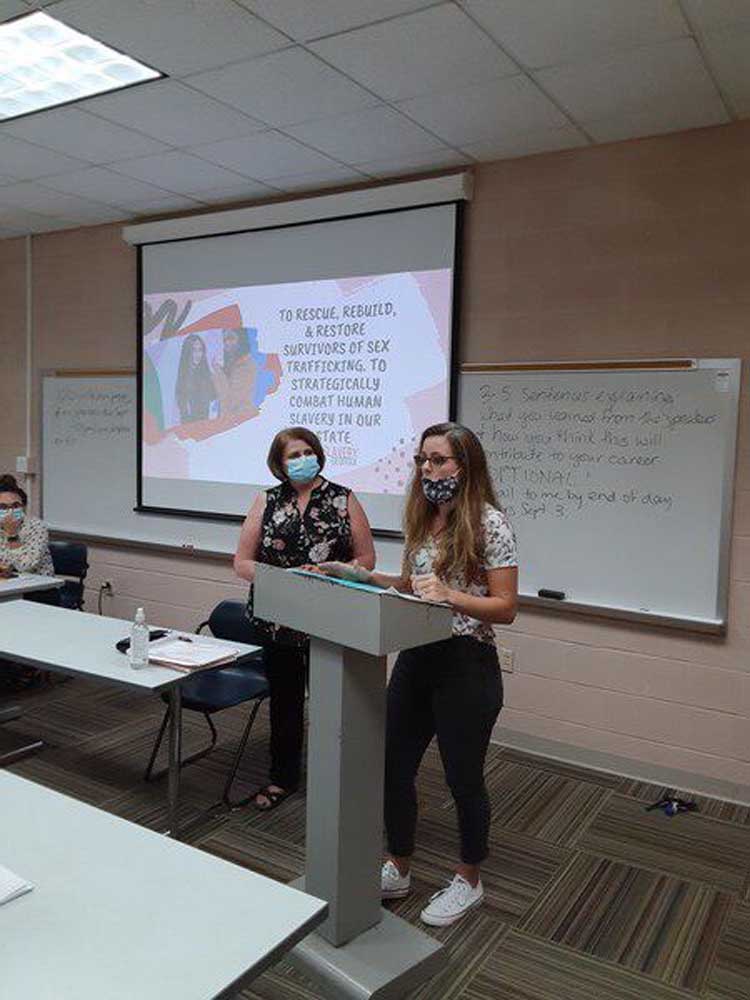Dalton State students encouraged to advocate against sex trafficking
Published 5:00 pm Sunday, September 6, 2020

- Ryan Anderson/Daily Citizen-NewsDebbie Crumbly, executive director of End Slavery Georgia, left, and Danielle Mullen, director of survivor care for End Slavery Georgia, speak to students at Dalton State College during a sex trafficking class.
Students in a Dalton State College sex trafficking class were urged this week to become advocates against the worldwide scourge.
“This is a tremendous opportunity for us to come here and talk to you,” said Debbie Crumbly, executive director of End Slavery Georgia. “You guys are the next generation on the front lines, and you are the hope.”
Trending
“It’s your job to bring awareness,” Danielle Mullen, director of survivor care for End Slavery Georgia, told the class members, many of whom are criminal justice majors or minors. “Keep fighting, because one person you save, that is their world.”
“The more people we educate, the better,” said Natalie Johnson, an associate professor of criminal justice at Dalton State who teaches the sex trafficking course. “It’s one thing for me to talk to you all about this, but (quite) another for you to plant seeds in others.”
“Exposure” to new information is one of the best elements of guest speakers, said Corey Creek, who is majoring in psychology with a criminal justice minor. “Many of us are drawn to this field to change the world, and being exposed to people that live and work inside the criminal justice field helps us get an idea of what life will be like for us after college.”
Crumbly, a nurse, was part of the founding group four years ago that established End Slavery Georgia in Rome, a city that up until then had no services specifically for victims of sex trafficking. The organization’s mission is to rescue, restore and rebuild survivors of sex trafficking, as well as to battle against this insidious crime.
End Slavery Georgia works with several partners, because this work requires so many “phases,” Crumbly said. “I would love to tell you that one organization can pull (a victim) off the street and take them from A to Z, but that isn’t possible.”
For example, survivors may need access to sex trauma therapists or help with substance addiction, the latter a common problem among those who have been trafficked, she said. “We facilitate and collaborate” with other agencies and organizations to ”help (survivors) rebuild their lives.”
Trending
Sex trafficking is considered a “hidden or silent crime, because it often goes unnoticed by the general public,” Mullen said. The lack of awareness makes it a lower-risk crime, and the profit potential is high.
“Penalties for traffickers are not harsh enough, in my opinion,” she said. “The profit is worth the risk.”
State attention
Human trafficking has been a major focus of Gov. Brian Kemp’s administration, spearheaded by first lady Marty Kemp, and “that’s a good thing,” Crumbly said. “It’s coming to light.”
In July, the governor signed several new laws aimed at reducing human trafficking in the state, including a bill that will ban traffickers from driving commercial vehicles for life.
The state also created the Georgians for Refuge, Action, Compassion and Education (GRACE) Commission, which is comprised of public officials, law enforcement personnel, for-profit and nonprofit organization representatives, representatives from faith-based institutions and subject matter experts, all united “to tackle human trafficking, seek justice for victims, and hold bad actors accountable,” according to the state. Among its many efforts, the Grace Commission provides human trafficking awareness training.
All backgrounds
End Slavery Georgia opened its safe house roughly 18 months ago, and “we have victims from all over the world,” Crumbly said. “Trafficking victims come from every background, and trafficking is easy for the trafficker, (which is) why you’re seeing more and more of it happening.”
And “a trafficker can be anyone,” Mullen said. When Mullen worked at a school prior to her time with End Slavery Georgia, a student reported another student had said she planned to commit suicide. That threat, particularly from a 9-year-old, understandably troubled Mullen, and investigation revealed the child was being prostituted for drugs by her mother every day after school, Mullen said. “This is happening in the U.S., and it is a nasty, nasty crime.”
The average age a victim becomes trafficked for the first time is 12-14, according to the Georgia Attorney General’s Office, and, according to the Human Trafficking Hotline, sex trafficking is by far the most common type of human trafficking in Georgia.
Tragically, the sex trafficking market is “moving toward the younger,” Crumbly said. “The money is in the younger.”
“Last time I checked, the going rate for sex with an infant was $5,000-$10,000,” she said. “It’s horrendous, and all the more reason the community needs to be educated.”
The U.S. Marshals Service recently announced the rescue of 39 endangered children in Georgia, 15 of whom were considered victims of sex trafficking, as part of Operation Not Forgotten, according to CNN. The children, who ranged in age from 3-17, were from several states.
A form of slavery
Sex trafficking is a form of slavery, as individuals perform commercial sex via fraud, force or coercion, Mullen said. Commercial sex is prostitution, pornography or performance in exchange for any item of value, not only money, but food, clothing, shelter or drugs.
Traffickers may groom potential victims for sexual exploitation, often first by identifying targets who are vulnerable in some way, then gaining their trust and filling needs, which creates dependency and loyalty, she said. Then, they isolate victims, and, finally, abuse begins.
Social media concerns
Social media can be a goldmine for traffickers, so people should be cautious in their posts and wary of those who comment and/or reach out to them, as posts can draw predators, she said. Traffickers and predators have also been known to use emojis to communicate information about victims, as “this language is always changing to be less (detectable).”
Physical evidence of abuse, avoiding eye contact, overly sexualized dress, branding tattoos and withdrawn behavior are just some potential signs someone may be a victim of sex trafficking, she said. “You have to know these by heart if you’re going to be an advocate against this horrible crime.”
If one does notice these signs — a full list of which can be found online at https://endslaveryga.org/recognize-the-signs — he or she shouldn’t just go right up to the individual, as it could endanger both parties and/or make the trafficker suspicious, she said. Instead, call the national trafficking hotline at (888) 373-7888 or, if the person appears in immediate, grave danger, call 911.
There are several other resources, such as Out of Darkness, which rescues and houses victims of sexual trafficking; GiGi’s House, which is dedicated to serving girls ages 13-19 who are victims of sex trafficking; Wellspring Living, which assists those at risk/victimized by sexual exploitation; and Georgia Cares, which serves child sex trafficking victims across the state. More information on those organizations and others can be found online.
“I learned so much after hearing from End Slavery Georgia, mostly that helping women who are survivors of sex trafficking is a long process, and there is no linear solution to easing them back into society,” Creek said. “Only with exposure and (advocacy) will we see change when it comes to human trafficking, (and) then we will finally see the needle move toward progress.”
Johnson has encouraged and even required her students to volunteer with organizations like End Slavery Georgia, because it’s important to be knowledgeable in sex trafficking, especially for those planning to pursue criminal justice careers, she said. “Traffickers rely on your ignorance to get away with their crimes.”
“You can’t begin to catch them, much less convict and incarcerate them, if we aren’t educated on the red flags and how to identify victims,” she added. “And when I say ‘we,’ I mean everyone.”





